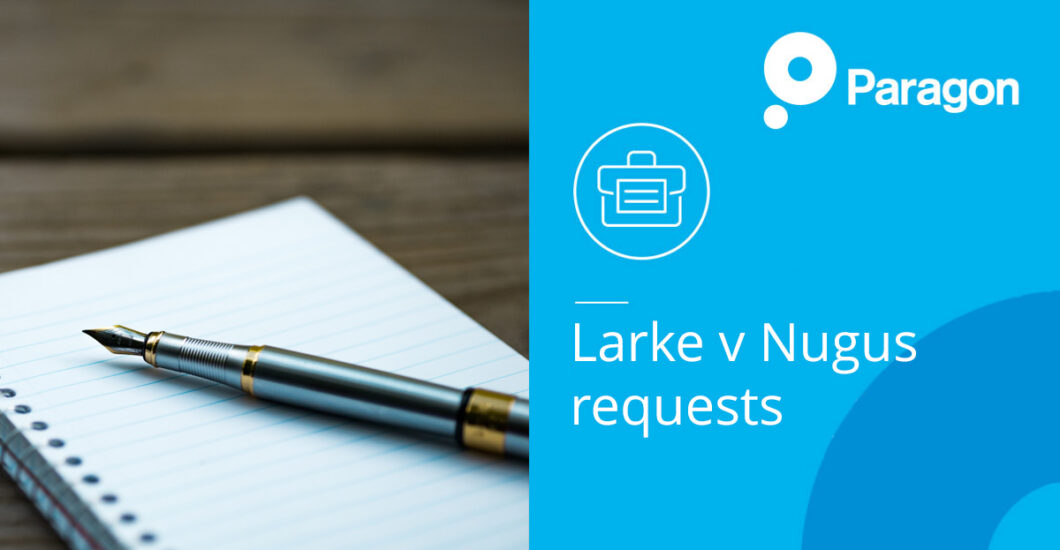Larke v Nugus requests

Many insured solicitors’ firms whose practice involves drafting and execution of Wills will be familiar with the concept of a Larke v Nugus request. The request will usually set out a list of information required to be provided by way of a statement following the case of Larke v Nugus [2000] WTLR 1033.
Such requests are received from parties who are generally:
- Interested in the estate of a deceased person; and / or are
- Disputing / considering disputing the circumstances under which a Will was produced and / or executed.
Difficulties lie in knowing whether receipt of such a request should be notified to your Professional Indemnity Insurers. There will also be difficulties relating to the balance of duties of confidentiality and disclosure.
There is no legal or regulatory duty to provide a statement, however, it is generally recommended that a statement should be provided in order to avoid an adverse costs order should a formal claim be made. It can also result in a potential dispute being stopped in its tracks.
The Law Society has published practical guidance and we recommend that any practitioners who may be involved in circumstances where wills are disputed should familiarise themselves with that note.
Is it notifiable?
In the first instance, discuss with your broker and familiarise yourself with your policy wording and the policy definitions. Ultimately, if there is any doubt as to the circumstances surrounding the drafting of the Will or if the request specifically alludes to possible issues / negligence against the Will drafter, then it should be notified.
Inevitably, the request will refer to the Larke v Nugus ruling which held that where there was doubt concerning the validity of a Will and questions exist surrounding the execution of that Will, the Will drafter should make available a statement of evidence setting out the circumstances surrounding the preparation of the Will and its execution. The potential dispute must be serious and go beyond the mere entering of a caveat. It should not be used by potential claimants (usually disgruntled) as a “fishing expedition”. It can be worth taking some time to write to the requestor to acknowledge the request but to reasonably seek further information into the potential dispute if there is limited information in the request.
Simple file requests are often not notifiable if the request is from new solicitors and there is no indication of investigation into alleged poor handling of the underlying matter. Similarly, with Larke v Nugus requests, if there is no insinuation of wrongdoing and upon a review of the underlying file there are no concerns with conduct in the drafting and execution of the Will, then, pending a discussion with your broker, it is likely it is not necessary to notify the matter.
Ultimately, however, a Larke v Nugus request is usually sent by a party who has a reason to suspect the circumstances surrounding the drafting and execution of a Will and there must be a potentially serious dispute. At that stage, without a particularised claim, technically any Larke v Nugus request may be notifiable. Communicate with the requestor and liaise with your broker or designated claims handlers. It is better to seek advice / further information than assume a matter is not notifiable.
On receipt of a valid Larke v Nugus request:
- Is the Testator alive? If so, the request is almost certainly premature because a new Will could still be made by the Testator or by statutory means. Inform the Testator or their Power of Attorney and ask for their permission to disclose any information but highlight to them that it is a premature request and that there is no obligation to provide a response.
- Consider whether the Will drafter or your firm is appointed as an executor.
- The case of Larke v Nugus dealt with a firm of solicitors who drafted the Will and were also an executor. Technically therefore disclosure of information about a Will under a Larke v Nugus request only applies to solicitors who are also the executors. However, an obiter comment in Buckenham v Dickinson 2 [2000] WTLR 1083 suggests the principles set out in Larke v Nugus can also apply to Will drafters who are not also executors to the Will.
- A Will drafter (or their relevant firm) who is NOT also an executor should get consent from the executors before making any disclosure. The duty of confidentiality to a testator passes to the executors as personal representatives after the Testator’s death. Even if a Will drafter is one of a number of executors, whilst the authority is joint and several, it is always best practice to obtain permission from all personal representatives.
- Consider whether the Will drafter is a solicitor: This means that all documents written to or by the solicitor for the purpose of obtaining legal advice and assistance are privileged.
- The Will drafter should weigh this up against the risk of an adverse costs order against the executors if the will is contested and the decision NOT to disclose privileged documents is seen as a relevant factor.
- If the Will drafter is an executor, the privilege belongs to them to decide if they want to waive privilege and disclose or not.
- If the Will drafter is NOT an executor, they should explain to the executors that the documents are privileged but allow them to decide whether to waive that privilege or not.
- Consider with the executors whether or not the beneficiaries should be consulted. A neutral stance should be maintained as far as possible with the beneficiaries and the potential claimant.
- Is the scope of the request too wide? The statement should only disclose information surrounding the drafting of the Will and how it was executed.
- If the Will drafter or your firm have also been appointed as executors, should there be concern in relation to possible negligence, there will be a high risk of an own interest conflict and you should liaise with the other executors and inform them to seek independent legal advice and offer to step down as executor. If your firm is not an executor or involved in the administration of the estate, the executors will likely already be receiving independent legal advice, but ensure that they are aware of the potential dispute
- What if the will file has been destroyed:
- The firm should review the file retention policy under Law Society: Practice notes: File retention: wills and probate: How long should files be kept?
- If there is no longer a will file, the will drafter should prepare a witness statement with all the information they can recall about the circumstances surrounding the will instructions and the execution of the will with a statement of truth.
- What if the will drafter has left the firm:
- The firm should contact them and ask them to prepare a witness statement.
- Consider applying for a temporary grant from the Probate Registry in order to protect assets subject to the Will until a full grant can be obtained.
How to Respond
- You will be expected to provide a full statement of evidence as to the preparation of the will, and the circumstances in which it was executed. The will drafter should provide a witness statement supported by relevant information from the Will file. In some cases, sending a copy of the Will file may be most efficient, but:-
- Consider the correspondence in the file that does NOT belong to the client (the executors).
- Consider which documents might be protected by legal advice privilege. Seek authority to waive that privilege if appropriate.
- Consider the information about the testator’s spouse where instructions were taken jointly.
- Consider the information that should be redacted to comply with data protection duties.
- Consider the information that might provoke a negligence claim from the beneficiaries.
- Manage the Requestor’s expectations in terms of time scale. If you need to request the underlying file from storage, inform them. Otherwise, try to respond within 2-3 weeks. Delay may be prejudicial to any later claim.
- Most requestors will offer to pay reasonable photocopying costs. In addition, the SRA Code of conduct does not prohibit solicitors from charging reasonable costs for producing information. If you intend to charge, which may be appropriate in instances where there is no obvious potential claim against you, provide an estimate to the requestor and ideally get their agreement in advance of providing the statement.
This article has been provided by Rebecca Steward and Steven Reynolds of Reynolds Colman Bradley LLP. If you have any questions about Reynolds Colman Bradley , Paragon or the above article please do not hesitate to get in touch.
CONTACT US
Ryan Senior
E rsenior@paragonbrokers.com
T +44 (0)20 7280 8254
M +44 (0)7827 575 652
Piers Winton
E pwinton@paragonbrokers.com
T +44 (0)20 7280 8224
M +44 (0)7787 375378

